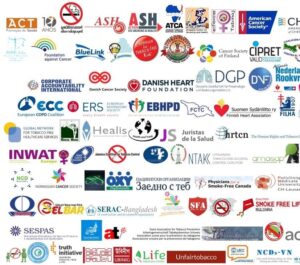What is this colourful montage?
It’s comprised of the some of the logos of organisations from all over the world who were signatories to a letter addressed to André Calantzopoulos, CEO of Philip Morris International, and if they omitted his title on the envelope from lack of respect for this loathsome person I don’t blame them.
If I did not miscount, there were 123 organisations representing global health, human rights, consumer protection, medical and other bodies, and five individuals who appended their names to the letter.
And what did this long list of signatories want of Mr Calantzopuolos? With unarguable logic they demanded that he, on behalf of the Tobacco Giant that he runs, ‘immediately cease the production, marketing and sale of cigarettes.’ And about time too, you might say.
They don’t mince their words:
PMI, its shareholders, and you personally have been enriched while knowingly killing your customers. You have it in your immediate power to change the fate of millions of people, perhaps hundreds of millions. Do the right thing by immediately ceasing the production, marketing and sale of cigarettes.
There is, however, a slight problem with this letter. A month later an editorial in The British Medical Journal by the well known anti-tobacco campaigner, Simon Chapman, put it thus: ‘This is, of course, thoroughly naïve.’
What inspired the letter was the recent announcement by Philip Morris that they were ‘Designing a Smoke-Free Future’ with new inventions that are supposed to be safer alternatives to conventional cigarettes, such as heated tobacco products and e-cigarettes.
Professor Chapman ends his editorial by saying:
With tobacco companies now embracing the rhetoric of the end of smoking it is time for governments to take the industry at its word and set those dates when combustible tobacco products will be banned.
Yes, he uses the B-word.
Philip Morris International no doubt has a department to deal with letters like this of which they probably receive a fair number every day. In fact, when I started my anti-tobacco activism I sent a similar letter to all the major cigarette manufacturers. I got polite replies along the following lines that we can paraphrase as a short dialogue between a Public Health Advocate (PHA) and Big Tobacco (BT):
PHA: You admit your cigarettes are addictive and cause many serious diseases. Why, then, don’t you stop making and selling them?
BT: We’re working on potentially less dangerous products and as soon as these are widely taken up by the adult smoking public we’ll stop making ordinary cigarettes.
PHA: But that may take decades! Why not stop now?
BT: We have a responsibility to our shareholders not to put ourselves out of business.
Of course, tobacco companies are never going to stop making cancer sticks, or at least not until their new products generate a similar amount of income. And when will that be?
It’s governments, therefore, that should take the lead to ban combustible tobacco products. But will they? It seems they are as much addicted to the revenue from tobacco taxes as are smokers to the nicotine in cigarettes that keeps the tobacco companies’ profits nice and healthy.
It would have been more sensible if the colourful letter had been addressed to governments – to start with, say, those of the US and UK.
The likes of Philip Morris are never going to do the decent thing (don’t laugh), no matter what they may say. But in the meantime, our doughty 123 organisations and five individuals can feel they’ve done their bit by attacking the duplicitous Mr Calantzopoulos.
How about all governments following the splendid example of Bhutan and putting the B-word into effect?
Tobacco should be banned – worldwide.
Text © Gabriel Symonds


Leave A Comment